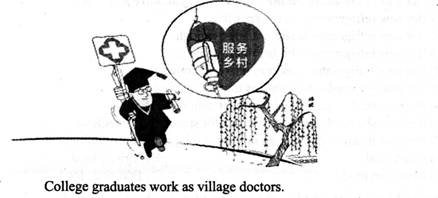2015年英語四級考試每日一練(5月4日)
1、根據材料,回答問題。
Directions: There are 2 passages in this section. Each passage is followed by some questions or unfinished statements. For each of them there are four choices markedA.,B., C. and D.. You should decide on the best choice and mark the corresponding letter on Answer Sheet 2 with a single line through the centre.
Passage One
Questions 56 to 60 are based on the following passage.
Let children learn to judge their own work. A child learning to talk does not learn by being corrected all the time: if corrected too much, he will stop talking. He notices a thousand times a day the difference between the language he uses and the language those around him use. Bit by bit, he makes the necessary changes to make his language like other people's. In the same way, when children learn to do all the other things they learn to do without being taught to walk, run, climb, whistle, ride a bicycle--compare those performances with those of more skilled people, and slowly make the needed changes. But in school we never give a child a chance to find out his own mistakes for himself, let alone correct them. We do it all for him. We act as if we thought that he would never notice a mistake unless it was pointed out to him, or correct it unless he was made to. Soon he becomes dependent on the teacher. Let him do it himself. Let him work out, with the help of other children if he wants it, what this word says, what answer is to that problem, whether this is a good way of saying or doing this or not.
If it is a matter of right answers, as it may be in mathematics or science, give him the answer book. Let him correct his own papers. Why should we teachers waste time on such routine work? Our job should be to help the child when he tells us that he can't find the way to get the right answer. Let's end this nonsense of grades, exams,marks. Let us throw them all out, and let the children learn what all educated persons must someday learn, how to measure their own understanding, how to know what they know or do not know.
Let them get on with this job in the way that seems most sensible to them, with our help as school teachers if they ask for it. The idea that there is a body of knowledge to be learnt at school and used for the rest of one's life is nonsense in a world as complicated and rapidly changing as ours. Anxious parents and teachers say, "But suppose they fail to learn something essential, something they will need to get in the world?" Don't worry! If it is essential, they will go out into the world and learn it.
What does the author think is the best way for children to learn things?
A.By imitating what other people do.
B.By making mistakes and having them corrected.
C.By listening to explanations from skilled people.
D.By asking a great many questions.
2、聽音頻:
Directions: In this section, you will hear 8 short conversations and 2 long conversations. At the end of each conversation, one or more questions will be asked about what was said. Both the conversation and the questions will be spoken only once. After each question there will be a pause. During the pause, you must read the four choices marked A ),B., C. andD., and decide which is the best answer. Then mark the corresponding letter on Answer Sheet 1 with a single line through the centre.
A.She copied another course guide.
B.She decided to skip class.
C.She went to the library instead.
D.She shared a friend's course guide.
填空題
3、
__________
簡答題
4、Directions: For this part, you are allowed 30 minutes to translate a passage from Chinese into English. You should write your answer on Answer Sheet 2.
中國中央電視臺春節聯歡晚會,簡稱為春晚,是每年農歷除夕為慶祝農歷新年而現場直播的重要晚會。自1983年首屆春節聯歡晚會在中央電視臺播出以來,每年除夕之夜它都如期播出,這一傳統一直延續至今。春晚在演出規模、演員陣容、播出時長和海內外收視率上創下了世界之。春晚也成了大多數中國人每逢春節必看的電視節目,是中國除夕之夜的文化盛宴。
5、題目一
Directions:For this part,you are allowed 30 minutes to write a short essay on thefollowing question.You should write at least 120 words but no more than 180 words.
Suppose a foreign friend of yours is coming to visit your hometown,what is the most interesting place you would like to take him/her to see and why?
題目二
Directions:For this part,you are allowed 30 minutes to write a short essay on thefollowing question.You should write at least.120.words but no more than.180.words.Suppose a foreign friend of yours is coming to visit China,what is the most interesting place you would like to take him/her to see and why?
題目三
Directions:For this part,you are allowed 30 minutes to write a short essay on thefollowing question.You should write at least.120.words but no more than.180.words.Suppose a foreign friend of yours is coming to visit your campus,what is the most interesting place you would like to take him/her to see and why?
6、假日經濟的現象表明:中國消費者的消費觀正在發生巨大變化。根據統計數據,中國消費者的消費需求正在從基本生活必需品轉向對休閑、舒適和個人發展的需求。同時,中國人的消費觀(consumpt;on concept)在蓬勃發展的假日經濟中正變得成熟。因此產品結構應做相應調整,來適應社會的發展。另一方面,服務質量要改善,以滿足人們提高生活質量的要求。
7、世界上寶貴的除了良好的心理素質,還有一個東西,那就是勤奮。寶貴的勤奮,不僅是身體上的勤奮,而且是精神上的勤奮。文學家說,勤奮是打開文學殿堂之門的一把鑰匙;科學家說,勤奮能使人聰明;政治家說,勤奮是實現理想的基石;而平凡的人則說,勤奮是一種傳統的美德。可見,勤奮富有了多么巨大的底蘊與魅力。人類如果丟棄了它。不行。
8、You should write an essay entitled It Pays to Plan by commenting on the saying“lt wasn ’t raining when Noah built the ark.”You can give examples to illustrate your point.
寫作導航
1.通過俗語來詮釋計劃的重要意義;
2.解釋為什么計劃如此重要,并以CE0來舉例說明;
3.得出結論,建議大家做事情之前都應該制定詳細的計劃。
9、You should write an email inreply to a friend"s inquiry about whether you are going to work or continue your study after graduation.You shouM also explain the reasons behind your choice.
寫作導航
1.回應對方來信,提出自己的觀點,即會選擇繼續深造;
2.從就業形勢和知識的重要性兩方面闡述了做出該選擇的原因,并指出會通過
參加實踐活動來保持與時俱進;
3.進行總結;
4.按照書信格式表達感謝和祝愿。
10、

| ?γ??????? | ??? | ???/???? | ??????? | ???? |
|---|---|---|---|---|
| ????????????????????????????????? | ????? | ??100 / ??100 |  |
???? |
| ???????????????????????? | ????? | ??100 / ??100 |  |
???? |
| ???????????????????????? | ????? | ??100 / ??100 |  |
???? |
| ??????????????????д???? | ????? | ??100 / ??100 |  |
???? |







